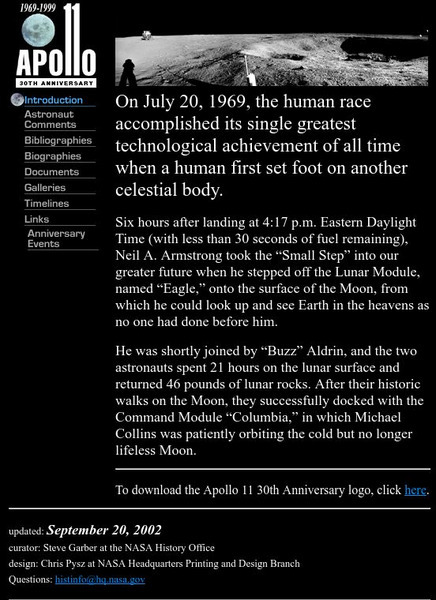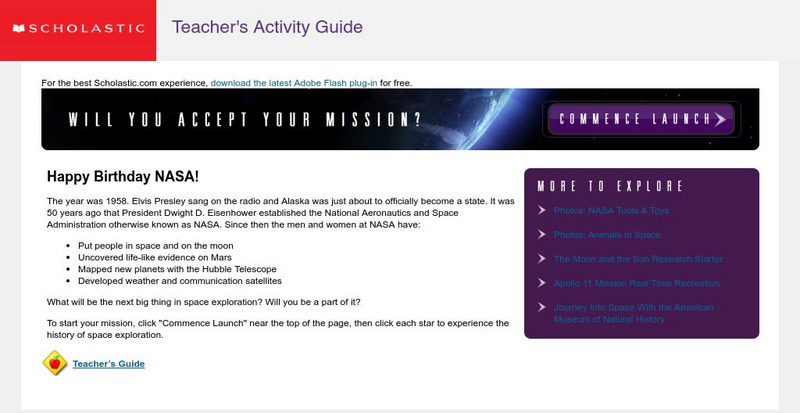Hi, what do you want to do?
Mr. E. Science
Manned Space Exploration: From Apollo to Present
How did the manned space mission program progress? The presentation covers American space exploration from the Apollo missions through the International Space Station.
Mr. E. Science
Manned Spaced Exploration: From Start to Gemini
Seven percent of Americans believe the moon landing was staged. The presentation covers manned space exploration from the beginning of the space race through the Gemini missions. The lesson is the 23rd in a set of 26.
DocsTeach
Landing a Man on the Moon: President Nixon and the Apollo Program
Take the small step for man and giant leap for mankind with the Apollo astronauts using primary sources. Young historians explore the documents related to the American space program up through the lunar landing, including presidential...
Curated OER
Team Moon
Students read "Team Moon: How 400,000 People Landed Apollo 11 on the Moon," by Catherine Thimmesh. They watch portions of the movie "Apollo 13." Students use the internet and the attached study guide to discover specific information...
Curated OER
Activity on United States Moon Landing: Apollo 11
Students use the World Wide Web to access additional information needed to complete a set of questions. They demonstrate an understanding of latitude and longitude by interpreting a lunar map.
Curated OER
"One Giant Leap for Mankind"
Young scholars explore the significance of the Apollo 11 lunar landing by interviewing an adult for memories of the mission. They incorporate their interviews into news articles as 'journalists' in July 1969 to document this historic...
Curated OER
Space Exploration
Sixth graders investigate the historical even surrounding the Apollo Mission to the Moon. They conduct research specifically to find information about the astronauts on the mission. The students conduct class discussion about the...
Curated OER
Moon Mining
Go on a moon mining expedition from the safety of your classroom with this space exploration simulation. Using simple models of the moon's surface prepared ahead of time by the teacher, young scientists are challenged with locating and...
John F. Kennedy Library Foundation
JFK Challenge
And so, my fellow Americans: ask not what your country can do for you—ask what you can do for your country. And so begins your invigorating, innovative learning experience in the JFK Challenge app! Learners...
Curated OER
Many Happy Returns
Students compare the journey of Lewis and Clark with the space flight of Apollo 11. Students sequence events using a timeline. Students write a persuasive essay trying to persuade the people of the US to support space exploration.
Curated OER
The Space Race in the '50's
Young scholars explore the impact of the space race. In this 1950's America lesson, students examine newspapers from the time period as well as Apollo mission episodes. Young scholars then create journals from the perspectives of Apollo...
University of Colorado
Distance = Rate x Time
Every year, the moon moves 3.8 cm farther from Earth. In the 11th part of 22, classes use the distance formula. They determine the distance to the moon based upon given data and then graph Galileo spacecraft data to determine its movement.
Curated OER
Cold War - The Space Race
In these Cold War worksheets, students read about the space race between the United States and Russia. Students also read about the first man on the moon and answer 8 questions about the texts.
Curated OER
What is Momentum?
In this momentum activity, students will calculate the maximum forward momentum of the Apollo 11 lunar spacecraft at three different stages of its space travel.
Curated OER
Life on the Moon
Students study the physical properties of the Moon. In this life on the moon lesson plan students describe the ways life on the Moon would be different than on Earth.
NASA
Packing for a L-o-o-o-ng Trip to Mars
Pack just enough to fit. Crews determine what personal items to take with them on a trip to Mars. Each team must decide what to take with them on a two-and-a-half year trip to Mars and whether their items will fit within the allotted...
Curated OER
Galaxies and the Universe
If Earth was formed 4600 million years ago, and the sun revolves about the center of the Milky Way once every 250 million years, how many revolutions have occurred? Students answer this question and ten more, all providing students with...
Curated OER
The Impact
Students study inventions and how they have impacted us. For this investigative lesson students study the history of two inventors then pretend that they are an inventor.
Curated OER
Moon Landing
Students research about the July 20, 1969, moon landing. They demonstrate their knowledge of the first moon landing by creating peek-a-boo rocket books. Also they can make their own moon rocks with an easy-to-make dough.
Curated OER
Exploring the Night Sky: Summer
Students explain how moon phases occur. They describe and explain at least two common misconceptions that people have about the moon. Students explain what a star is. They explain 3 ways that the night sky has been used throughout history.
NASA
Nasa, Human Space Flight: Apollo 11 Mission
The story of the Apollo 11 lunar landing is told with dramatic details, pictures, and mission highlights.
NASA
Nasa Star Child: Space Travel (Level 1)
Learn about the history of space travel. Audio content is included as well as vocabulary words linked to a glossary of terms.
NASA
Nasa: 1969 1999: Apollo 30th Anniversary
A special anniversary site for the Apollo 11 mission to the moon. Complete with comments from the astronauts, galleries with many images related to the mission, and much more.
Scholastic
Scholastic: Challenging the Space Frontier
This Scholastic website offers information about space exploration. Use this site to learn about specific missions like the Friendship, Apollo 11, and STS 7. Also Dr. Mae Jemison is featured and interviewed.




























